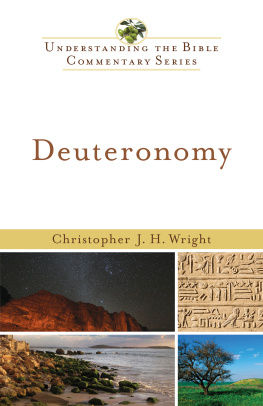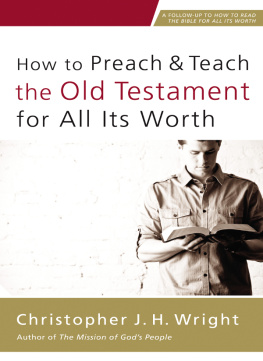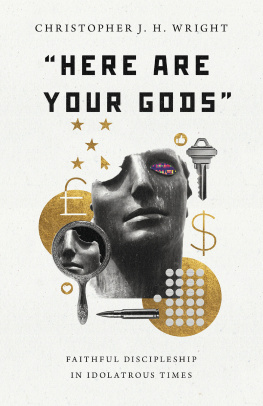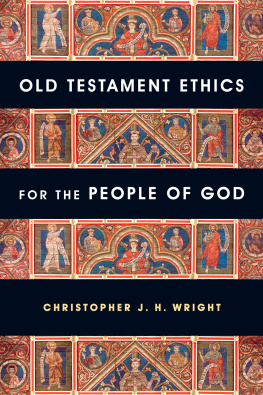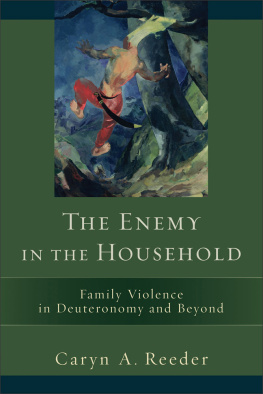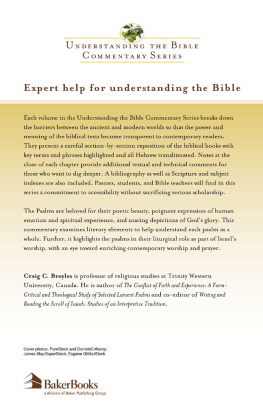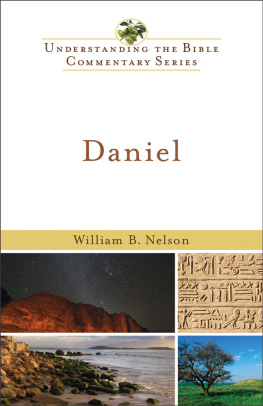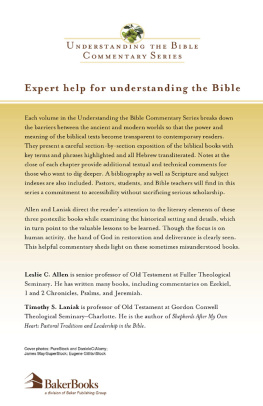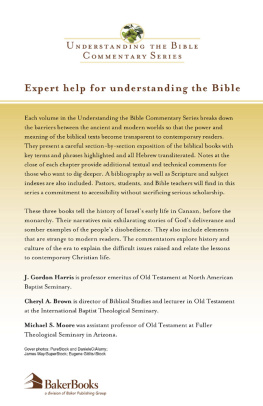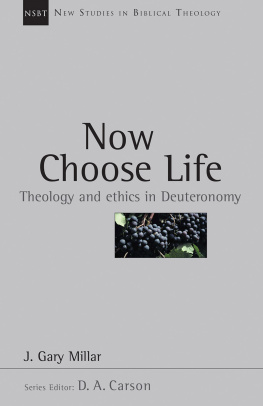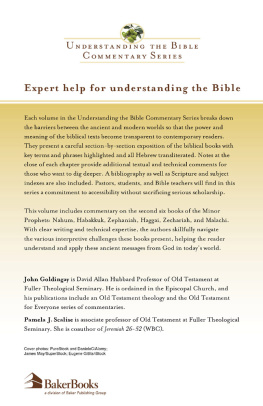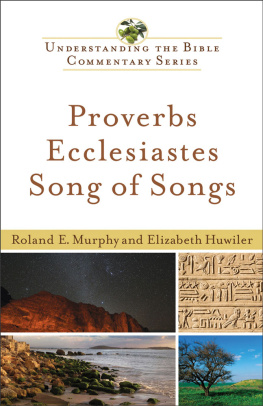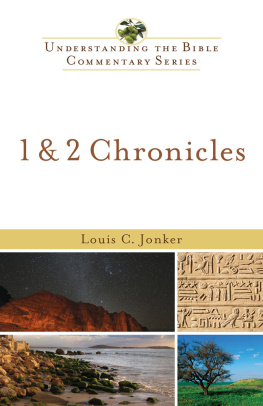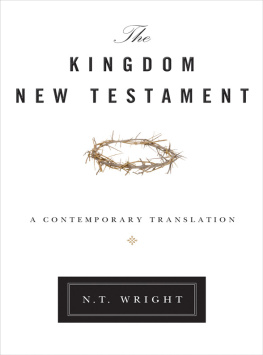Christopher J. H. Wright - Deuteronomy
Here you can read online Christopher J. H. Wright - Deuteronomy full text of the book (entire story) in english for free. Download pdf and epub, get meaning, cover and reviews about this ebook. year: 2012, publisher: Baker Publishing Group, genre: Religion. Description of the work, (preface) as well as reviews are available. Best literature library LitArk.com created for fans of good reading and offers a wide selection of genres:
Romance novel
Science fiction
Adventure
Detective
Science
History
Home and family
Prose
Art
Politics
Computer
Non-fiction
Religion
Business
Children
Humor
Choose a favorite category and find really read worthwhile books. Enjoy immersion in the world of imagination, feel the emotions of the characters or learn something new for yourself, make an fascinating discovery.
- Book:Deuteronomy
- Author:
- Publisher:Baker Publishing Group
- Genre:
- Year:2012
- Rating:5 / 5
- Favourites:Add to favourites
- Your mark:
- 100
- 1
- 2
- 3
- 4
- 5
Deuteronomy: summary, description and annotation
We offer to read an annotation, description, summary or preface (depends on what the author of the book "Deuteronomy" wrote himself). If you haven't found the necessary information about the book — write in the comments, we will try to find it.
Christopher J. H. Wright: author's other books
Who wrote Deuteronomy? Find out the surname, the name of the author of the book and a list of all author's works by series.
Deuteronomy — read online for free the complete book (whole text) full work
Below is the text of the book, divided by pages. System saving the place of the last page read, allows you to conveniently read the book "Deuteronomy" online for free, without having to search again every time where you left off. Put a bookmark, and you can go to the page where you finished reading at any time.
Font size:
Interval:
Bookmark:
1996 by Christopher J. H. Wright
Published by Baker Books
a division of Baker Publishing Group
P.O. Box 6287, Grand Rapids, MI 49516-6287
www.bakerbooks.com
Previously published jointly in 1996, in the United States by Hendrickson Publishers, and in the United Kingdom by the Paternoster Press.
Baker Books edition published 2012
Ebook edition created 2012
Ebook corrections 10.20.2017
All rights reserved. No part of this publication may be reproduced, stored in a retrieval system, or transmitted in any form or by any meansfor example, electronic, photocopy, recordingwithout the prior written permission of the publisher. The only exception is brief quotations in printed reviews.
Library of Congress Cataloging-in-Publication Data is on file at the Library of Congress, Washington, DC.
ISBN 978-1-4412-3832-0
Scripture quotations are from the Holy Bible, New International Version. NIV. Copyright 1973, 1978, 1984 by Biblica, Inc. Used by permission of Zondervan. All rights reserved worldwide. www.zondervan.com

G ENERAL E DITORS
W. Ward Gasque
Robert L. Hubbard Jr.
Robert K. Johnston
For
My dear wife
Liz
Contents
Foreword
As an ancient document, the Old Testament often seems something quite foreign to modern men and women. Opening its pages may feel, to the modern reader, like traversing a kind of literary time warp into a whole other world. In that world sisters and brothers marry, long hair mysteriously makes men superhuman, and temple altars daily smell of savory burning flesh and sweet incense. There, desert bushes burn but leave no ashes, water gushes from rocks, and cities fall because people march around them. A different world, indeed!
Even God, the Old Testaments main character, seems a stranger compared to his more familiar New Testament counterpart. Sometimes the divine is portrayed as a loving father and faithful friend, someone who rescues people from their greatest dangers or generously rewards them for heroic deeds. At other times, however, God resembles more a cruel despot, one furious at human failures, raving against enemies and bloodthirsty for revenge. Thus, skittish about the Old Testaments diverse portrayal of God, some readers carefully select which portions of the text to study, or they avoid the Old Testament altogether.
The purpose of this commentary series is to help readers navigate this strange and sometimes forbidding literary and spiritual terrain. Its goal is to break down the barriers between the ancient and modern worlds so that the power and meaning of these biblical texts become transparent to contemporary readers. How is this to be done? And what sets this series apart from others currently on the market?
This commentary series will bypass several popular approaches to biblical interpretation. It will not follow a precriticai approach that interprets the text without reference to recent scholarly conversations. Such a commentary contents itself with offering little more than a paraphrase of the text with occasional supplements from archaeology, word studies, and classical theology. It mistakenly believes that there have been few insights into the Bible since Calvin or Luther. Nor will this series pursue an anticritical approach whose preoccupation is to defend the Bible against its detractors, especially scholarly ones. Such a commentary has little space left to move beyond showing why the Bibles critics are wrong to explaining what the biblical text means. The result is a paucity of vibrant biblical theology. Again, this series finds inadequate a critical approach that seeks to understand the text apart from belief in the meaning it conveys. Though modern readers have been taught to be discerning, they do not want to live in the desert of criticism either.
Instead, as its editors, we have sought to align this series with what has been labeled believing criticism . This approach marries probing, reflective interpretation of the text to loyal biblical devotion and warm Christian affection. Our contributors tackle the task of interpretation using the full range of critical methodologies and practices. Yet they do so as people of faith who hold the text in the highest regard. The commentators in this series use criticism to bring the message of the biblical texts vividly to life so the minds of modern readers may be illumined and their faith deepened.
The authors in this series combine a firm commitment to modern scholarship with a similar commitment to the Bibles full authority for Christians. They bring to the task the highest technical skills, warm theological commitment, and rich insight from their various communities. In so doing, they hope to enrich the life of the academy as well as the life of the church.
Part of the richness of this commentary series derives from its authors breadth of experience and ecclesial background. As editors, we have consciously brought together a diverse group of scholars in terms of age, gender, denominational affiliation, and race. We make no claim that they represent the full expression of the people of God, but they do bring fresh, broad perspectives to the interpretive task. But though this series has sought out diversity among its contributors, they also reflect a commitment to a common center. These commentators write as believing criticsscholars who desire to speak for church and academy, for academy and church. As editors, we offer this series in devotion to God and for the enrichment of Gods people.
R OBERT L. H UBBARD J R .
R OBERT K. J OHNSTON
Editors
Preface
Having taught Deuteronomy in India and England for some seven years with deepening appreciation of the challenge and relevance of the book, I responded enthusiastically to Carl Armerdings original request to contribute this volume to the NIBCOT series. The enthusiasm has occasionally struggled to survive the merciless tyranny of the written word in comparison with the more congenial medium of preaching and lecturing, but it is still intact. Since Deuteronomy itself is the deposit of the preached word, I have tried to let the living voice be heard and not be stifled in the conventions of academic style.
Commentaries, unlike the Bible itself, need to justify their existence. If there is anything fresh in the presentation offered here, it will mainly be due to my concern to engage with the missiological relevance of Deuteronomy. In a sense, the whole Bible is related to missionthe mission of God in Gods world, the mission of Gods people in the midst of the nations. But Deuteronomy is particularly pregnant with implications and reflections on what it means to be the people of God, to be entrusted with the knowledge of the one living God, and to be challenged to live out that knowledge in the sight of the nations. Deuteronomy has much to teach any who care about the uniqueness of the biblical faith in the context of the ambient cultural idolatries of our age.
The additional notes will show my enormous debt to the writings of many scholars. Books and articles are cited in an abbreviated form, with full details in the bibliography. For the sake of the assumed readership of the series, the bulk of citations are in English, or in English translation. An authors name followed by a Bible book signifies a commentary.
At the heart of Deuteronomy stands chapter 15, with its laws on the release of debts and slaves. The writing of this commentary was made possible only by a number of releases for which I wish to express my appreciation. I am grateful to my colleagues on the staff of All Nations Christian College for the release of a sabbatical term in the summer of 1993, and to the students of my 199293 tutorial group who released their tutor, but not without their continued love and support. I spent the term at Tyndale House, Cambridge, and warmly thank the Warden, Bruce Winter, the Bursar, Iain Hodgins, and the Librarian, Andrew Clarke, for making my stay so comfortable and profitable.
Next pageFont size:
Interval:
Bookmark:
Similar books «Deuteronomy»
Look at similar books to Deuteronomy. We have selected literature similar in name and meaning in the hope of providing readers with more options to find new, interesting, not yet read works.
Discussion, reviews of the book Deuteronomy and just readers' own opinions. Leave your comments, write what you think about the work, its meaning or the main characters. Specify what exactly you liked and what you didn't like, and why you think so.

